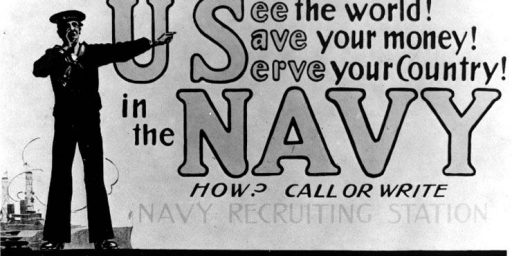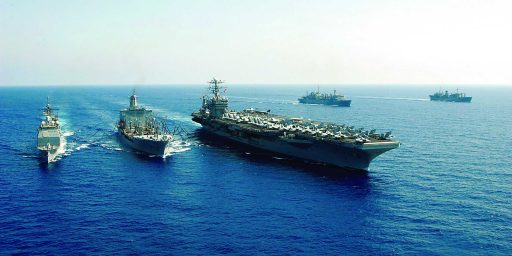Sixty-Eight Years Ago Today
I can’t think of any better way to mark the 68th anniversary of what, other than the landings at Inchon, may be the most daring military action in human history than with the speech that General Eisenhower read at the end of that day:
And, if the landings had failed, he would’ve said this:
“Our landings have failed and I have withdrawn the troops. My decision to attack at this time and place was based on the best information available. The troops, the air and the Navy did all that bravery could do. If any blame or fault attaches to the attempt it is mine alone.”
Thankfully, he did not have to say that.





Greetings:
The Progressive (née Public) Broadcasting System included an appropriate in their minds several minute report on its” PBS Newshour” program this evening. The report was about a female Japanese-American medical doctor who was interned at the Manzanor relocation camp during the dark days of World War II. Apparently, she suffered some. As did my departed father who was drafted (interned ???) in the US Army at age 35 and got to spend some of his time in similar camps on Saipan and Peleliu.
While I saw this report that will live in my infamy on KQED, one of the San Francisco Bay area’s PBS stations, the other, KCSM is just as bad. Last December 7th, they ran a half-hour program with a similar theme.
But this is probably all just accidental in a plausibly deniable kind of way.
America 2.0
@11B40: Oh, no, they spent several whole minutes on a subject that wasn’t about your dad? What is this world coming to?
Back to the actual subject (which has also gotten some coverage over the years IIRC), I think Doug summed it up fairly well. Not only was it daring, but it permanently changed history for the better. Eisenhower and the many people who sacrificed while performing their duty deserve all the accolades they received and more.
Is 11B40 serious? Does he have no idea what kind of America his father was fighting for? It was most definitely not an America that should have interned people because of their ethnicity, not because they’d actually done anything wrong – something that most people now regard as a cruel mistake based on fear. What an unworthy offspring of his father!
Greetings:
Well, let me try this then. As George Orwell might have typewritten, “All histories are equal; some histories are more equal.”
My obviously too subtle for some point was why is it that this singular aspect of World War II, the Japanese-American internment, is given such continuing prominence of place. Why is it that the dislocations, sufferings, and accomplishments of so many others during that war receive so little mention or acknowledgment?
No, it wasn’t too subtle; badly-spelled, but not too subtle. I disagree that the Japanese-American internment is given “prominence of place” – it’s received coverage, just like most of the issues around WWII. A good deal of that coverage and discussion concerned whether the internment was justified or whether America gave in to an unwarranted fear and over-reacted to a non-existent threat. As Americans we should pay attention to incidents where we failed to live up to our principles. Especially when we turn on fellow Americans and accuse them of being enemies.
And I believe that there has been substantial coverage for many years about veterans and survivors of the war itself. I’m actually kind of surprised that this could be in any doubt.
You obviously believe that this is some kind of deliberate slight on the part of somebody or somebodies, but without more detail it’s hard to tell.
@DRS:
Greetings, DRS:
I don’t disagree that there is a lesson to be paid attention to vis-a-vis the Japanese-American internment during WW II. At the same time, though, little is ever mentioned about the totally Japanese attacks along our West Coast in the early days of the hostilities, such as the attacks on the Southern California oil refineries and the fire-bombings in Oregon. And I don’t at all disagree that the Japanese-Americans got a short shrift. But there were a lot of short shrifts going around in those days.
What sticks in what remains of my craw is that these “media” types insist on trotting out these “reports” on days of much different historical significances. A once-a-year report on the anniversary of the day the internments began would be one thing. But to continue to replay the issue on dates with no relation to that issue seems quite forced to me. That that occurs on the anniversary of a date on which so many Americans sacrificed themselves to protect their country seems to me to be an attempt to either distract from or diminish those sacrifices.
I apologize for inflicting my mis-spellings on you. I’ll do better in the future.
Who is “continuing to replay the issue”? I haven’t seen print or electronic coverage or even mention of Japanese-American internments in years.